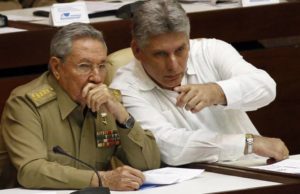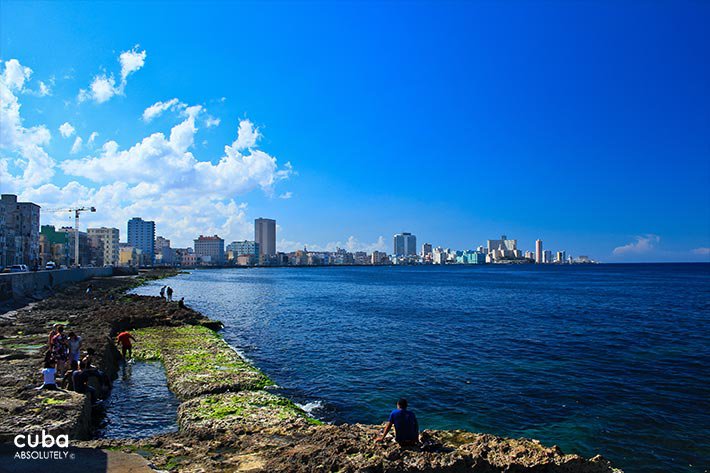 EN CUBA NO HABRÁ TRANSICIÓN.. NI SIQUIERA AL COMUNISMO.
EN CUBA NO HABRÁ TRANSICIÓN.. NI SIQUIERA AL COMUNISMO.
La clásica definición de que el socialismo es una etapa de tránsito hacia el comunismo ha generado históricos debates teóricos y ha sido el parteaguas entre los movimientos políticos que se ubican a la izquierda en el espectro de las ideologías. También ha propiciado destellos de humor como la afirmación de que “lo peor que tiene el comunismo son los primeros 500 años del socialismo”.
Ese instante largamente anhelado en el que “los bienes materiales corren a chorros llenos” y la humanidad podría inscribir en sus banderas la regla de oro “de cada cual según sus capacidades, a cada cual según sus necesidades” ya no aparece como una meta explícita en la próxima Constitución de la República. La palabra comunismo ha sido borrada del proyecto. Esta omisión, o mejor, esta tachadura, no constituye una sorpresa para quienes habían leído atentamente la Conceptualización del modelo aprobada en el séptimo congreso del PCC. En ese texto que se estuvo cocinando durante casi diez años no se menciona que el resultado final del modelo sea la llegada a la sociedad comunista, ni siquiera se plantea el propósito de “eliminar la explotación del hombre por el hombre”.
Solo en la memoria de quienes rozan o sobrepasan la tercera edad queda el recuerdo de aquellos tiempos en que el Fidel Castro eligió una herejía diferente al proclamar que era posible construir el socialismo y el comunismo al mismo tiempo. Era la década de los 60 y en el poblado de San Andrés en el municipio La Palma de Pinar del Río se pretendió el experimento de suprimir el dinero y ponerlo todo gratis para beneficio de sus 500 pobladores. Era también la época en que Nikita Jruschov prometía en Moscú que “la presente generación soviética vivirá en el comunismo” y en las universidades cubanas y otros centros de pensamiento se vaticinaba el feliz momento en que la bandera roja del proletariado ondearía sobre el capitolio de Washington.
RESUMEN DE HOY.
En la sesión del parlamento cubano donde se discutió este sábado la eliminación de esa palabra, el presidente de la Asamblea Nacional aseguró que su ausencia “no quiere decir que renunciemos a nuestras ideas, sino que en nuestra visión pensamos en un país socialista, soberano, independiente, próspero y sostenible”. Más adelante argumentó que la situación actual de la Isla y el contexto internacional son muy diferentes a las que había en 1976 cuando se escribió la primera Constitución del periodo revolucionario.
Si alguien hubiera tenido la audacia de sugerir la anulación del término comunismo en cualquiera de los congresos del partido presididos por Fidel Castro habría sido acusado al menos de revisionista y probablemente de traidor. Aún hoy debe suponerse que a muchos viejos militantes les cueste trabajo aceptar esta supresión y se estén preguntando a estas alturas cómo es posible que el camino socialista sea “irrevocable” pero el punto final del viaje, el destino obligado de esa ruta, quede sin mencionar.
Los escolares de la enseñanza primaria que cada día expresan la consigna “pioneros por el comunismo, seremos como el Che” deben empezar a buscar un nuevo lema en el próximo septiembre, so pena de llevarle la contraria a la Carta Magna.
La sociedad comunista resulta inviable por dos razones fundamentales. La primera porque los recursos del planeta no lo permiten, la segunda, porque la ambición personal forma parte indisoluble de la naturaleza humana.
Habría que felicitar a Raúl Castro por haber tenido el coraje político o al menos el pragmatismo de eludir el compromiso con una meta inalcanzable. Pero para ser coherente con semejante decisión tendría que eliminar también en el preámbulo que los cubanos estamos “guiados por las ideas político-sociales de Marx, Engels y Lenin” y finalmente cambiarle el nombre al partido que dirige. Para eso tendría el recurso de apelar al adjetivo “fidelista”, una doctrina fundamentada en el voluntarismo y con la necesaria ausencia de rigor científico que permite validar cualquier solución, cualquier cambio.
Frecuentemente lento en sus decisiones, Raúl Castro nunca se decidió a inscribir al sistema cubano bajo las imprecisas definiciones de “el socialismo del siglo XXI” y lo dejó todo colgando del posesivo plural “nuestro”. Ha desmontado la mayor parte de las quimeras impuestas por su hermano mientras juraba fidelidad a su legado. Ahora, cuando su retiro definitivo no parece demorar más de un lustro ha dejado claro que el destino final de este experimento tendrá que ser definido por otros.
 (OPINION) IN CUBA THERE WILL BE NO TRANSITION … NOT EVEN TO COMMUNISM.
(OPINION) IN CUBA THERE WILL BE NO TRANSITION … NOT EVEN TO COMMUNISM.
The classic definition that socialism is a transit stage towards communism has generated historical theoretical debates and has been the watershed between the political movements that are located on the left in the spectrum of ideologies. It has also prompted flashes of humor as the statement that “the worst thing that communism has are the first 500 years of socialism.”
That long-longed moment in which “material goods run with full jets” and humanity could inscribe in their flags the golden rule “of each according to his abilities, to each according to his needs” no longer appears as an explicit goal in the next Constitution of the Republic. The word communism has been deleted from the project. This omission, or better, this erasure, does not constitute a surprise for those who had carefully read the Conceptualization of the model approved in the seventh congress of the PCC. In that text that was cooking for almost ten years, it is not mentioned that the final result of the model is the arrival in the communist society, nor even the purpose of “eliminating the exploitation of man by man”.
Only in the memory of those who touch or surpass the third age is the memory of those times when Fidel Castro chose a different heresy by proclaiming that it was possible to build socialism and communism at the same time. It was the decade of the 60s and in the town of San Andrés in the municipality of La Palma in Pinar del Río the experiment was intended to suppress the money and put it all free for the benefit of its 500 inhabitants. It was also the time when Nikita Khrushchev promised in Moscow that “the present Soviet generation will live in communism” and in Cuban universities and other centers of thought the fortunate moment was predicted when the red flag of the proletariat would wave over the Washington capitol .
SUMMARY OF TODAY.
In the session of the Cuban parliament where the elimination of that word was discussed on Saturday, the president of the National Assembly assured that his absence “does not mean that we renounce our ideas, but in our vision we think of a socialist, sovereign country, independent, prosperous and sustainable “. Later he argued that the current situation of the island and the international context are very different from those in 1976 when the first Constitution of the revolutionary period was written.
If anyone had the audacity to suggest the annulment of the term communism in any of the party congresses presided over by Fidel Castro, he would have been accused at least of being a revisionist and probably a traitor. Even today it must be assumed that many old militants find it difficult to accept this suppression and are wondering at this point how it is possible for the socialist road to be” irrevocable “but the final point of the trip, the obligatory destination of that route, is not mentioned.
Primary school children who every day express the slogan “pioneers for communism, we will be like Che” should start looking for a new theme in September, under penalty of contrary to the Magna Carta.
The communist society is unfeasible for two fundamental reasons. The first because the resources of the planet do not allow it, the second, because personal ambition is an indissoluble part of human nature.
Raúl Castro should be congratulated for having had the political courage or at least the pragmatism to avoid commitment to an unattainable goal. But to be consistent with such a decision, I would also have to eliminate in the preamble that we Cubans are “guided by the political-social ideas of Marx, Engels and Lenin” and finally change the name of the party that he leads. For that I would have recourse to appeal to the adjective “fidelista”, a doctrine based on voluntarism and the necessary absence of scientific rigor that allows to validate any solution, any change.
Frequently slow in his decisions, Raúl Castro never decided to enroll the Cuban system under the vague definitions of “socialism of the 21st century” and left everything hanging from the plural possessive “ours”. He has dismantled most of the chimeras imposed by his brother while swearing allegiance to his legacy. Now, when his definitive retirement does not seem to take more than five years, he has made it clear that the final destination of this experiment will have to be defined by others.
Agencies/14ymedio/Reinaldo Escobar/ Internet Photos/ Arnoldo Varona/ TheCubanHistory.com
THE CUBAN HISTORY, HOLLYWOOD.




